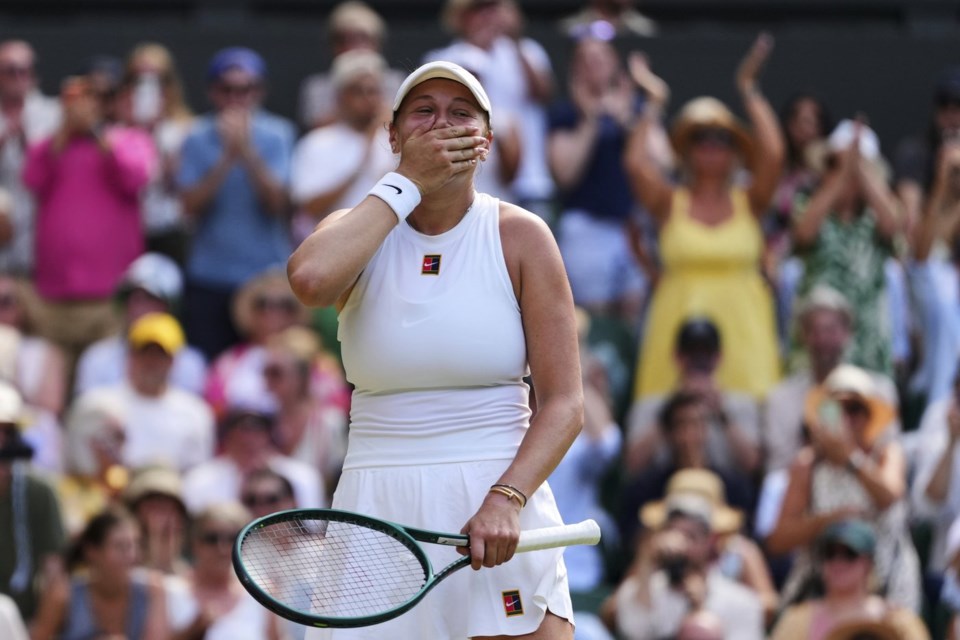LONDON (AP) — A little more than two years ago, Amanda Anisimova took a break from tennis because of burnout. A year ago, working her way back into the game, the American lost when she had to go through qualifying for Wimbledon because her ranking of 189th was too low to get into the main bracket automatically.
Look at Anisimova now: She's a Grand Slam finalist for the first time after upsetting No. 1-ranked Aryna Sabalenka 6-4, 4-6, 6-4 in a compelling contest at a steamy Centre Court on Thursday.
In Saturday's final, Anisimova will face Iga Swiatek, who is a five-time major champion but advanced to her first title match at the All England Club with a 6-2, 6-0 victory over Belinda Bencic.
Swiatek was dominant throughout, never letting Bencic get into their far-less-intriguing semifinal and wrapping things up in 71 minutes with serves at up to 119 mph and twice as many winners, 26, as unforced errors, 13.
So it turns out she can do just fine on grass courts, thank you very much.
“Tennis keeps surprising me. I thought I lived through everything, even though I'm young. I thought I experienced everything on the court. But I didn't experience playing well on grass,” Swiatek said. “That’s the first time.”
She's 5-0 in major finals — 4-0 on the French Open's clay, 1-0 on the U.S. Open's hard courts — but only once had been as far as the quarterfinals at Wimbledon until now. It's been more than a year since Swiatek won a title anywhere, part of why the 24-year-old from Poland relinquished the top ranking to Sabalenka in October and is seeded No. 8 this fortnight.
Saturday’s winner will be the eighth consecutive first-time Wimbledon women’s champion.
The 13th-seeded Anisimova, who was born in New Jersey and grew up in Florida, was playing in her second major semifinal after losing at that stage at the 2019 French Open at age 17.
“This doesn’t feel real right now,” Anisimova said after ending the 2-hour, 36-minute contest with a forehand winner on her fourth match point. “I was absolutely dying out there. I don’t know how I pulled it out.”
In May 2023, Anisimova took time off, saying she had been “ struggling with my mental health ” for nearly a year.
Now 23, she is playing as well as ever, her crisp groundstrokes, particularly on the backhand side, as strong and smooth as anyone’s. She is guaranteed to break into the top 10 of the WTA rankings for the first time next week, no matter what happens in the title match.
“If you told me I would be in the final of Wimbledon, I would not believe you,” Anisimova said with a laugh. “At least not this soon, because it’s been a year turnaround since coming back and to be in this spot, it’s not easy. ... To be in the final is just indescribable, honestly.”
For Sabalenka, 0-3 in semifinals at the All England Club, this defeat prevented her from becoming the first woman to reach four consecutive Grand Slam finals since Serena Williams won four major trophies in a row a decade ago.
Sabalenka missed Wimbledon last year because of an injured shoulder, then won the U.S. Open in September for her third Slam title.
She was the runner-up to Madison Keys at the Australian Open, and to Coco Gauff at the French Open, where Sabalenka’s post-match comments drew criticism and led her to apologize both privately to Gauff and publicly. Sabalenka and Gauff smoothed things over before the start of play at the All England Club, dancing together and posting videos on social media.
On Thursday, Sabalenka began her news conference with as simple a statement as can be, “She was the better player,” then laughed.
“Losing sucks, you know?” she added in response to the first question from a reporter. “You always feel like ... you don’t want to exist anymore.”
Anisimova improved to 6-3 against Sabalenka, a 27-year-old from Belarus, and two of the hardest hitters in the game traded booming shots and loud shouts.
They smacked big serves: Sabalenka reached 120 mph, Anisimova 112 mph. They ended points quickly with first-strike aggressiveness.
The average exchange was over after just three shots. By the end, 167 of the 214 total points lasted fewer than five strokes, and just seven contained nine or more.
Probably a good thing, too, given the heat.
The temperature hit 88 degrees Fahrenheit (31 degrees Celsius) in the first set, which was delayed twice because spectators in the lower level — with no shade — felt unwell.
One key to the outcome: Anisimova saved 11 of the 14 break points she faced.
There was a particularly lengthy shout by Sabalenka in the second set, shortly after she was angered when Anisimova made some noise during another back-and-forth. When the game ended, with Sabalenka making the score 3-all, she let out another scream.
Sabalenka, who double-faulted to end the opening set, pulled even by closing the second set with a 114 mph service winner. She she broke to begin the third.
Could have been daunting for Anisimova. Instead, she didn’t waver, coming back to lead 5-2. Only then did some tension arrive anew, as Anisimova wasted her first match point, and Sabalenka broke for 5-4.
Anisimova stayed right there and, with another break, she had won, then covered her mouth with her right hand.
___
AP tennis: https://apnews.com/hub/tennis
Howard Fendrich, The Associated Press



